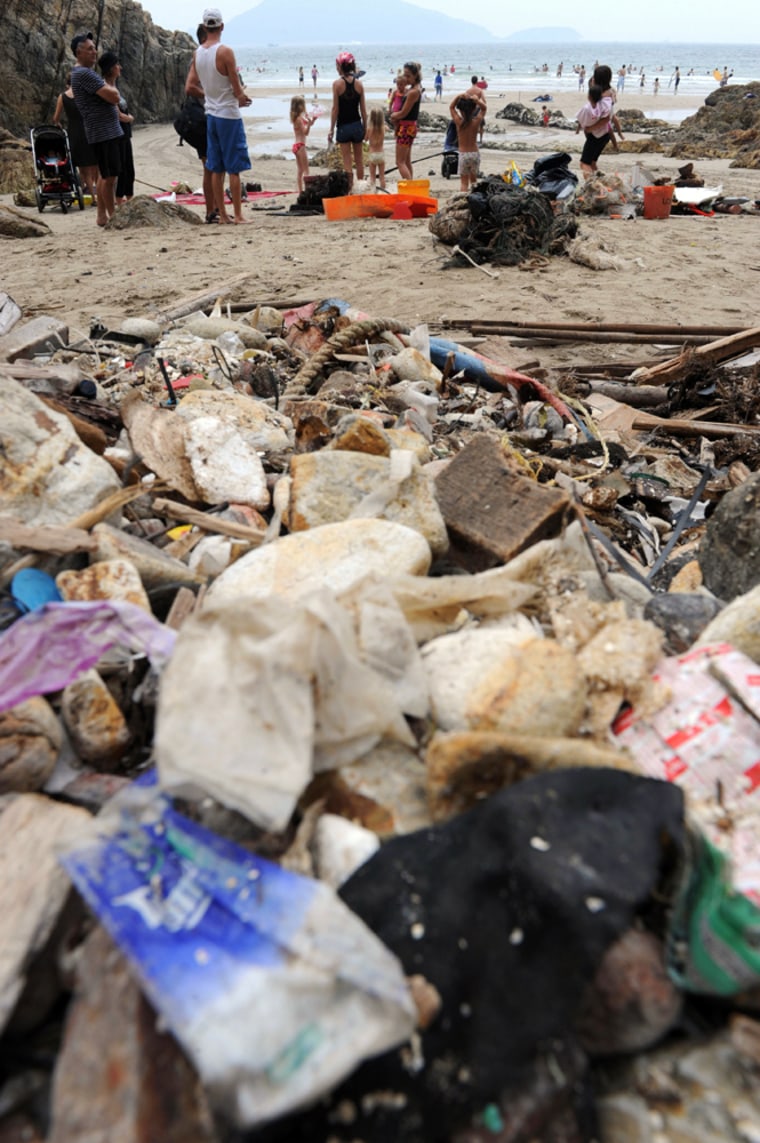Amidst waves and wildlife in the world's oceans, billions of pounds of Styrofoam, water bottles, fishing wire and other plastic products float in endless circles.
This bobbing pollution is more than just an eyesore or a choking hazard for birds. According to a new study, plastic in the oceans can decompose in as little as a year, leaching chemical compounds into the water that may harm the health of animals and possibly even people.
"Most people in the world believe that this plastic is indestructible for a very long time," said Katsuhiko Saido, a chemist at Nihon University in Chiba, Japan. He spoke this week at a meeting of the American Chemical Society in Washington, D.C.
"We are now concerned that plastic pollution is caused by invisible materials," Saido said through an interpreter. "This will have a great effect on marine life."
Patterns in ocean currents create conglomerations of swirling trash that have received a burst of attention recently. The so-called Great Pacific Garbage Patch, for one, is a mound of waste, mostly plastic, that's about twice the size of Texas. It lies some 1,000 miles off the west coast between California and Hawaii.
Cooking up chemicals
In Japan, Saido said, up to 150,000 tons of plastic wash on shore each year. Much of it is Styrofoam, a type of polystyrene plastic.
In their lab, Saido and colleagues used a new chemical technique to simulate the decomposition of polystyrene plastic in the oceans at 30 degrees Celsius (86 Fahrenheit). The process produced some potentially toxic chemicals, including bisphenol A (BPA) and PS oligomer.
"Evan at 30 degrees Celsius, it decomposes," said Saido's colleague Yoichi Kodera, who also spoke at the conference. "In natural conditions, the tide comes in and sunlight heats the plastics," he said, which should only enhance degradation.
When the scientists analyzed samples of ocean water from the United States, Japan, India, Europe and elsewhere, they found traces of these and other plastic degradation byproducts, including styrene monomer (SM), styrene dimer (SD) and styrene trimer (ST) — none of which are found normally in nature.
"Dr. Saido's study means that marine plastic debris could be the dominant source of degradation products, such as styrenes and BPA in remote coasts and the open ocean," said Hideshige Takada, of the Tokyo University of Agriculture and Technology. In urban areas, he said, there are other potential sources of these chemicals.
Same process on land
Previous experiments have shown that, when heated in the microwave or under other conditions, plastics leach BPA and other compounds, said John Meeker, an epidemiologist at the University of Michigan School of Public Health in Ann Arbor. So, it's not surprising that the same thing might happen in the ocean.
Still, he added, scientists don't yet know how degradation of plastic in the oceans might affect the health of animals or people. PS oligomer and BPA have both produced hormone-disrupting effects and reproductive problems at low levels in animals, but the possible effect on humans is still controversial.
"At this point, we're likely to have more intense exposures in our own homes and daily lives than from ocean water," Meeker said. "If this type of thing could happen in landfills and rivers and places that are closer to our drinking water, there could be an issue of human exposure."
